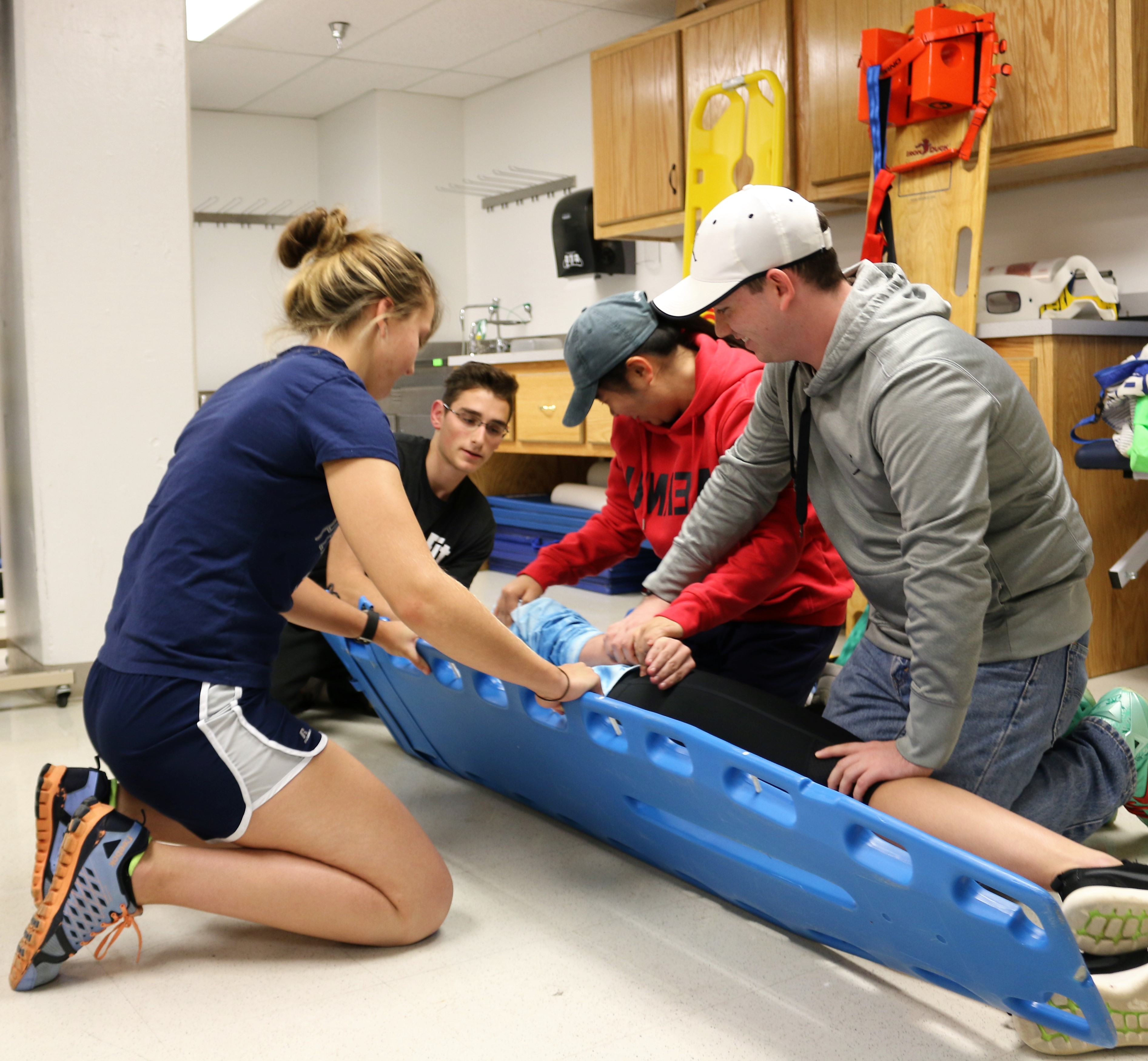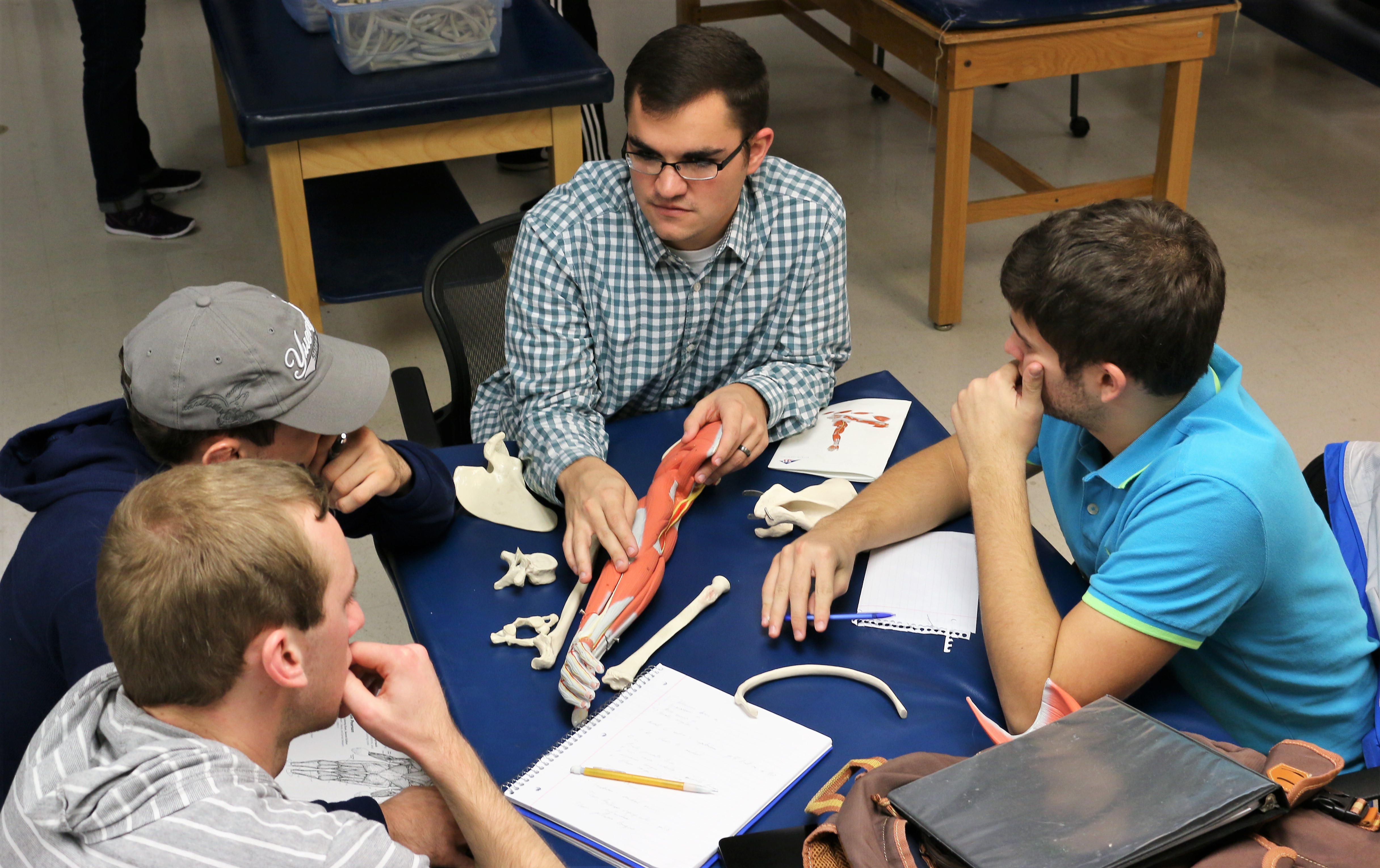Considerations Before Applying
Considerations Before Applying To Either Phase Of The Athletic Training Program
Student Health and Technical Standards
The Athletic Training major is a rigorous, and intense program that places specific requirements, and demands on the students enrolled in the program. There are potential risks related to some learning experiences such as, but not limited to, communicable disease[s], strenuous activity, toxic substances, and the potential for bodily harm. An objective of this program is to prepare graduates to enter a variety of employment settings, and to render care to a wide spectrum of individuals engaged in physical activity. The technical standards set forth by the major establish the essential requirements considered necessary for students admitted to this program to achieve the knowledge, skills, and competencies of an entry-level athletic trainer, as well as meet the expectations of the program's accrediting agency. Please read an overview of health-related matters as well as the abilities, and expectations all students admitted to the major must meet as provided here.
Immunization/Vaccination Requirements

Students pursuing or enrolled in the Athletic Training major will complete the majority of clinical education experiences in the Department of Intercollegiate Athletics athletic training facilities at University Park Campus, and Penn State Medical Groups at the University Park Regional Campus. As health care operations, these units have specific immunization/vaccination requirements instituted to safeguard the wellbeing of patients, and employees as well as medical, and allied health care students. As an allied health care professional preparation program, students will be expected to comply with these associated immunization/vaccination standards as a means to be able to satisfy the related clinical education experiences necessary to fulfill degree requirements.
As part of these requirements, students must also receive an annual flu vaccine in October. In the event of allergies associated with the flu vaccine, clinical education sites will make reasonable efforts to offer suitable alternatives for related students. If students elect not to receive the flu vaccine, they will be expected to wear a mask, and follow related communicated precautionary measures to all clinical education activities at associated sites.
Please be aware that the Department of Intercollegiate Athletics, and Penn State Medical Groups do not currently accept waivers for religious, or philosophical reasons; therefore, students who do not meet these immunization/vaccination requirements will most likely not be able to meet the criteria to complete a degree in this program. Read additional information on immunization/vaccination requirements that is accessible here.
Varsity Student-Athletes
Varsity student-athletes are very unlikely to be able to complete the undergraduate Athletic Training major given conflict between the unique demands of the program (e.g. fixed schedule of athletic training-specific coursework, and accompanying clinical education requirements), and their sport/team activities; therefore, Penn State student-athletes wishing to earn an athletic training degree are strongly encouraged to do so via an entry-level master’s program. Details on the route to certification through a master’s degree are here. Varsity student-athletes should note that the undergraduate Kinesiology major is an excellent preparatory program for graduate studies in athletic training.
Dual Majors and Minors
Students wishing to frequent dual majors are very unlikely to be able to complete the undergraduate Athletic Training major given the unique demands of the program (e.g. fixed schedule of athletic training-specific coursework, and accompanying clinical education requirements), which yields high potential for conflict with other degree program requirements.
While challenging, completing a minor while an Athletic Training major is possible. It will take organization, and motivation on the part of the student as well as strategic planning, and course scheduling given that prioritizing athletic training-specific coursework, and clinical internships is a requirement of the degree program. As a reference, a very limited number of athletic training students complete a minor.
Schreyer Honors College Students
Gifted, and motivated students that are accepted, or eligible for entry in the Schreyer Honors College are certainly able to complete a degree in athletic training. The Athletic Training major at Penn State has an excellent track record for graduating students with Honors. Students that elect to complete the Honors program as an Athletic Training major may Honors option athletic training-specific coursework, and have the potential opportunity to collaborate with faculty, staff, graduate students, and peers across the breadth of the University in completing their thesis research requirement.

Students with Considerable Time Constraints
In similar fashion, students that are not able to dedicate the time necessary to effectively complete the clinical education component of the major, due to varying conflicting commitments, are strongly discouraged from pursuing the major, and advised to consider other programs of study. While extracurricular activities are permissible (within the appropriate limits), priority to Athletic Training major coursework, and clinical internship activities are expected, and required to graduate in an orderly fashion. Please read information on clinical internship attendance expectations, which is found here.
Students Below a 2.8 Cumulative GPA
Students with a cumulative GPA below 2.80 are not eligible for admission to the Athletic Training major, and are strongly discouraged from applying to the Pre-Professional Phase or Professional Phase. It is recommended that students in this scenario consult with their academic advisor to discuss alternative plans for programs of study.
Those individuals that have an interest in pursuing a degree in athletic training, but post a cumulative GPA below 2.80 should consider the necessity to complete additional semesters of coursework to elevate their academic profile to be competitive for admission to such a program. Students in this particular scenario are strongly encouraged to thoroughly reflect on the highly selective admissions nature of allied health care programs overall, and seek guidance from their academic advisor to determine the feasibility of pursuing a degree in athletic training. Determined students in this circumstance are strongly encouraged to do so via an entry-level master’s program. Details on the route to certification through a master’s degree are here. Alternative programs of study, particularly if a student’s interests revolve around human movement, and associated professions may consist of a curriculum like the Kinesiology major, which is also an excellent preparatory program for graduate studies in athletic training.
Students Beyond the First Year of Undergraduate Studies
Prospective students beyond the first year of undergraduate studies are welcome to apply; however, it should be noted that the major has a very prescribed sequence of coursework, and clinical education requirements that must be delivered over the span of 5 semesters, which allows for very little flexibility in scheduling. Students in this scenario should also be aware that required Athletic Training major-specific courses are offered in Fall, and Spring Semesters only. There are no required Athletic Training major-specific courses offered during Maymester or Summer Sessions.
Those individuals beyond the first year of undergraduate studies that have an interest in pursuing the major should consider the necessity to complete additional semesters beyond the typical 8 usually needed in order to graduate from the University, which will carry financial implications. Prospective students in this unique situation are strongly encouraged to thoroughly reflect on the highly selective admissions nature of the major, and seek guidance from their academic advisor to determine if they are viable candidates. Given the holistic admissions process, those individuals that consider themselves competitive are certainly welcome to apply, while those that are dubious of gaining acceptance to the major are recommended to discuss other programs of study with their academic advisor.
Students in this category, despite their potential of being competitive for the undergraduate Athletic Training major, may contemplate exploring a degree in athletic training via an entry-level master’s program after completing a preparatory curriculum like the undergraduate Kinesiology major. Details on the route to certification through a master’s degree can be found here.
Program Costs
Students are encouraged to use the Tuition and College Cost Estimator for an approximate gauge of expense associated with the Athletic Training major. In addition to standard tuition, and applicable fees, students in the Athletic Training major are also subject to program-specific fees tied to coursework, and clinical education experiences. A breakdown of current programmatic fees is provided here.
Additional variable costs for clinical education experiences, which account for mandatory background, and medical clearances, student professional liability insurance, professional association fees, attire, and possible transportation necessities are estimated to range between $600.00 - $800.00 over the total course of enrollment in the major. Other variable expenses tied to sitting for the BOC for the Athletic Trainer national exam, and non-compulsory extracurricular professional development opportunities can be found by respectively visiting the BOC for the Athletic Trainer website, and related sources (e.g. NATA Convention, EATA Convention, and PATS Convention).
